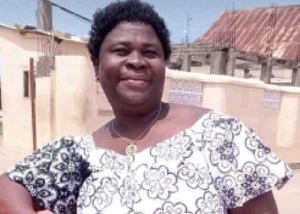
According to a report by Modern Ghana. In a desperate search for justice, the family of a slain chopbar operator from Anloga, Ghana, has turned to the Nogokpo Temple after local police made little headway in their investigation. The victim, known across the town for his popular cuisine, was discovered dead under unexplained circumstances. Despite law enforcement efforts, no major leads have been produced, prompting the family to seek spiritual solutions.
The tragic death of the popular chopbar operator has left the Anloga neighborhood stunned and dismayed. Residents are frustrated by his death, which occurred under unusual circumstances, especially because local police are still struggling to identify prospective suspects or make any progress in the inquiry. With little hope from formal law enforcement, the victim's family has turned to the Nogokpo Temple, a well-known traditional place that is frequently sought after by those seeking to uncover hidden realities.
The Nogokpo Temple, located in Ghana's Volta Region, has a long history of uncovering secrets and supporting people in seeking justice through spiritual methods. When the legal justice system fails to deliver, many Ghanaians turn to ancient spiritual practices for guidance or resolution of complex issues. This method, while contentious in some circles, is strongly ingrained in Ghanaian culture and reflects the junction of modern law enforcement and traditional belief systems.
The family's decision to seek assistance from the Nogokpo Temple drew widespread attention in Anloga and surrounding places. For them, this is a hopeful step, as they believe the temple will provide answers where the police have not. Others in the community have expressed worry, questioning whether depending on spiritual practices is an adequate substitute for police work. This development has spawned a broader discussion regarding the relevance of traditional techniques in the pursuit of justice, as well as the increasing dependence on spiritual answers when the state apparatus appears useless.
The case has also sparked controversy about the Ghana Police Service's ability to solve crimes, particularly in rural areas with little resources and investigative capacity. While some have expressed dissatisfaction with the investigation's slow progress, others have emphasized the growing importance of traditional behaviors in contemporary culture. In a society where traditional and modern belief systems coexist, the case emphasizes the complex interplay between faith, law, and justice.
As the family embarks on their spiritual journey to seek answers, the outcome remains uncertain. The case continues to raise questions about the effectiveness of both the police and spiritual interventions in the pursuit of justice. Whether the Nogokpo Temple will be able to uncover the truth or whether law enforcement will make further progress in solving the crime remains to be seen.
For now, the people of Anloga and surrounding communities are waiting for answers, as this tragic and mysterious event continues to stir emotions and provoke conversations about justice in modern Ghana. The intersection of traditional practices and law enforcement remains a powerful reminder of the region's diverse ways of seeking resolution and closure in times of crisis.